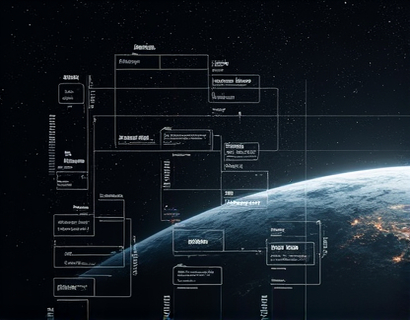Economic Dynamics and Market Opportunities in Modern Ecosystems: Insights for Navigating Success
The landscape of modern economies has evolved significantly, transforming traditional notions of market dynamics and opportunities. This comprehensive guide delves into the intricate economic dynamics of contemporary ecosystems, providing essential insights and strategic strategies for professionals across various fields to identify and capitalize on emerging market opportunities. Whether you are an economist, business analyst, entrepreneur, investor, financial advisor, economic researcher, business strategist, market analyst, or industry professional, understanding these dynamics is crucial for staying competitive and innovative in today's rapidly changing economic environment.
Understanding Modern Economic Ecosystems
Modern economic ecosystems are complex networks of interconnected entities, including businesses, consumers, governments, and technological platforms. These ecosystems operate on principles that differ from traditional economic models, emphasizing interdependence, innovation, and rapid adaptation. The rise of digital technologies, globalization, and shifting consumer behaviors have created a dynamic environment where new opportunities emerge continuously.
One of the key characteristics of modern economic ecosystems is their networked nature. Unlike linear supply chains, these ecosystems are characterized by multiple nodes and pathways, allowing for diverse interactions and collaborations. This networked structure fosters innovation through the exchange of ideas and resources, enabling entities to leverage collective strengths and address complex challenges more effectively.
Drivers of Change in Economic Ecosystems
The economic dynamics of modern ecosystems are influenced by several key drivers, each contributing to the evolving landscape. Technological advancements, regulatory changes, and shifts in consumer preferences are among the most significant factors shaping these ecosystems.
Technological advancements, particularly in areas such as artificial intelligence, blockchain, and the Internet of Things (IoT), are revolutionizing how businesses operate and interact. These technologies enhance efficiency, create new business models, and open up unprecedented opportunities for innovation. For instance, AI-driven analytics can provide deep insights into consumer behavior, enabling businesses to tailor their offerings and marketing strategies with precision.
Regulatory changes also play a crucial role in shaping economic ecosystems. Governments around the world are implementing policies to address issues such as data privacy, environmental sustainability, and market competition. These regulations can both challenge and opportunity businesses, requiring them to adapt quickly to new requirements while seeking to influence policy frameworks to their advantage.
Shifts in consumer preferences are another critical driver. Today's consumers are more informed, discerning, and demanding than ever before. They prioritize sustainability, social responsibility, and personalized experiences. Businesses that can align their strategies with these evolving preferences are more likely to succeed in the competitive landscape of modern ecosystems.
Identifying Market Opportunities
Navigating the economic dynamics of modern ecosystems requires a proactive approach to identifying and capitalizing on market opportunities. Here are some strategic insights to help professionals stay ahead:
- Embrace Innovation: Continuous innovation is essential in modern ecosystems. Businesses should invest in research and development to stay at the forefront of technological advancements and create unique value propositions. Collaboration with startups and academic institutions can also accelerate innovation processes.
- Leverage Data Analytics: Data-driven decision-making is crucial for understanding market trends and consumer behaviors. Implementing advanced analytics tools can provide valuable insights, enabling businesses to make informed strategic decisions and optimize operations.
- Focus on Sustainability: Sustainability is no longer a niche concern but a core expectation. Businesses that integrate sustainable practices into their operations and products can attract environmentally conscious consumers and meet regulatory requirements, opening up new market segments.
- Build Strong Ecosystem Partnerships: In a networked ecosystem, partnerships are vital. Collaborating with complementary businesses, technology providers, and other stakeholders can enhance capabilities, reduce risks, and create synergies that drive growth.
- Adapt to Regulatory Changes: Staying informed about regulatory developments and proactively adapting to new requirements can provide a competitive edge. Engaging with policymakers and industry groups can also influence favorable regulatory environments.
- Personalize Customer Experiences: Tailoring products and services to meet individual customer needs is key to success. Utilizing customer data and feedback to refine offerings can enhance customer satisfaction and loyalty, driving repeat business and positive word-of-mouth.
Each of these strategies requires a deep understanding of the ecosystem in which a business operates. Professionals must stay informed about industry trends, technological advancements, and regulatory changes to identify and seize opportunities effectively.
Strategic Approaches for Business Success
To navigate the complexities of modern economic ecosystems and achieve long-term success, businesses need to adopt strategic approaches that align with the evolving landscape. Here are some key strategies:
First, agility and flexibility are paramount. In a rapidly changing environment, businesses must be able to pivot quickly in response to new challenges and opportunities. This requires a culture of adaptability and a willingness to experiment and learn from failures.
Second, building a strong brand is essential for differentiation and trust. A robust brand identity can help businesses stand out in crowded markets and foster customer loyalty. Investing in brand storytelling, quality, and customer service can enhance brand value over time.
Third, focusing on digital transformation is critical. Embracing digital technologies can streamline operations, improve customer experiences, and open up new revenue streams. Businesses should consider digitalizing processes, leveraging e-commerce platforms, and utilizing social media for marketing and engagement.
Fourth, fostering a culture of innovation within the organization is vital. Encouraging creativity, providing resources for R&D, and rewarding innovative ideas can drive continuous improvement and growth. Establishing innovation labs or partnering with tech startups can also inject fresh perspectives and technologies into the business.
Finally, building resilient supply chains is crucial for sustainability. Modern ecosystems often involve global supply chains, making businesses vulnerable to disruptions. Diversifying suppliers, investing in supply chain visibility tools, and developing contingency plans can mitigate risks and ensure business continuity.
Case Studies: Success in Modern Ecosystems
Examining real-world examples can provide valuable insights into how businesses have navigated the economic dynamics of modern ecosystems. Here are a few notable case studies:
One prominent example is Netflix. Initially a DVD rental service, Netflix transformed into a leading streaming platform by embracing technological innovation and understanding changing consumer preferences. The company's data-driven approach to content creation and personalization has set new standards in the entertainment industry, allowing it to thrive in a highly competitive market.
Another example is Tesla, which has revolutionized the automotive industry by focusing on electric vehicles and sustainable energy solutions. Tesla's commitment to innovation, coupled with strategic partnerships and a strong brand, has enabled it to capture a significant market share despite initial skepticism. The company's approach to direct-to-consumer sales and over-the-air software updates has also set it apart from traditional automakers.
These case studies illustrate the importance of adaptability, innovation, and a customer-centric approach in achieving success within modern economic ecosystems.
Conclusion
Navigating the economic dynamics of modern ecosystems requires a deep understanding of the interconnected nature of businesses, technologies, and consumers. By embracing innovation, leveraging data analytics, focusing on sustainability, building strong partnerships, and adapting to regulatory changes, professionals can identify and capitalize on emerging market opportunities. Strategic approaches such as agility, brand building, digital transformation, innovation culture, and resilient supply chains are essential for long-term success. By staying informed and proactive, businesses can thrive in the dynamic and ever-evolving landscape of modern ecosystems.










































